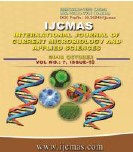


 National Academy of Agricultural Sciences (NAAS)
National Academy of Agricultural Sciences (NAAS)

|
PRINT ISSN : 2319-7692
Online ISSN : 2319-7706 Issues : 12 per year Publisher : Excellent Publishers Email : editorijcmas@gmail.com / submit@ijcmas.com Editor-in-chief: Dr.M.Prakash Index Copernicus ICV 2018: 95.39 NAAS RATING 2020: 5.38 |
Systemically acquired resistance (SAR) and Induced systemic resistance (ISR) agents can trigger host system to produce phenolic compounds, PR proteins, sugars which impart resistance in plants against invading pathogens. The application of different concentrations of salicylic acid and Trichoderma viride (Tri-25) viz., single inoculation, combination inoculation with challenge inoculation of Exserohilum turcicum on the enhancement of growth and management of disease with special emphasis to ISR and SAR against turcicum leaf blight disease. Total phenols content were positively regulated in both the inbred lines treated with T. viride and salicylic acid in combination. In ISR, the proteins content increased from the 7th day of sampling and in SAR, the protein contents were increased from 24 hr to 72 hr in all the treatments. The higher amount of total sugars was noticed in resistant as compared to susceptible inbred line. Total sugars, reducing sugars and non-reducing sugars were less in pathogen inoculated maize inbred lines. Chlorophyll content maximum in resistant compared to susceptible inbred line and increased over a period of time in all the treatments except in pathogen inoculation. Combination of salicylic acid and T. viride has quite long term influence on enhancement of biochemical components in host plant.
 |
 |
 |
 |
 |